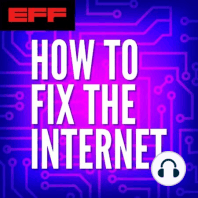67 min listen

Pilot Part 1: The Secret Court Approving Secret Surveillance
Pilot Part 1: The Secret Court Approving Secret Surveillance
ratings:
Length:
67 minutes
Released:
Nov 6, 2020
Format:
Podcast episode
Description
In the inaugural episode of EFF's "How to Fix the Internet" podcast, the Cato Institute’s specialist in surveillance legal policy, Julian Sanchez, joins EFF hosts Cindy Cohn and Danny O’Brien as they delve into the problems with the Foreign Intelligence Surveillance Court, also known as the FISC or the FISA Court. Sanchez explains how the FISA Court signs off on surveillance of huge swaths of our digital lives, and how the format and structure of the FISA Court is inherently flawed. In this episode, you’ll learn about: How the FISA Court impacts your digital privacy The makeup of the FISA Court and how judges are chosen How almost all of the key decisions about the legality of America's mass Internet spying projects have been made by the FISC How the current system promotes ideological hegemony within the FISA court How the FISC’s endless-secrecy-by-default system insulates it from the ecosystem of jurisprudence that could act as a guardrail against poor decisions as well as accountability for them How the FISC’s remit has ballooned from approving individual surveillance orders to signing off on broad programmatic types of surveillance Why we need a stronger amicus role in the FISC, and especially a bigger role for technical experts to advise the court Specific reforms that could be enacted to address these systemic issues and ensure a more fair review of surveillance systems Julian is a senior fellow at the Cato Institute and studies issues at the intersection of technology, privacy, and civil liberties, with a particular focus on national security and intelligence surveillance. Before joining Cato, Julian served as the Washington editor for the technology news site Ars Technica, where he covered surveillance, intellectual property, and telecom policy. He has also worked as a writer for The Economist’s blog Democracy in America and as an editor for Reason magazine, where he remains a contributing editor. Sanchez has written on privacy and technology for a wide array of national publications, ranging from the National Review to The Nation, and is a founding editor of the policy blog Just Security. He studied philosophy and political science at New York University. Find him on Twitter at @Normative. A transcript of the episode, as well as legal resources – including links to important cases, books, and briefs discussed in the podcast – is available at https://eff.org/deeplinks/2020/11/secret-court-approving-secret-surveillance. Please subscribe to How to Fix the Internet using your podcast player of choice. If you have any feedback on this episode, please email podcast@eff.org. Audio editing for this episode by Stuga Studios: https://www.stugastudios.com. Music by Nat Keefe: https://natkeefe.com/ This work is licensed under a Creative Commons Attribution 4.0 International License.
Released:
Nov 6, 2020
Format:
Podcast episode
Titles in the series (46)
Pilot Part 1: The Secret Court Approving Secret Surveillance: In the inaugural episode of EFF's "How to Fix the Internet" podcast, the Cato Institute’s specialist in surveillance legal policy, Julian Sanchez, joins EFF hosts Cindy Cohn and Danny O’Brien as they delve into the problems with the Foreign Intelligence Surveillance Court, also known as the FISC or the FISA Court. Sanchez explains how the FISA Court signs off on surveillance of huge swaths of our digital lives, and how the format and structure of the FISA Court is inherently flawed. by How to Fix the Internet